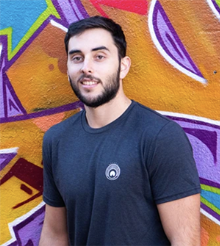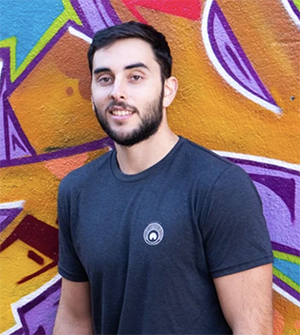
Jason Nemerovski is a researcher with Equidem, a global human- and labor-rights organization. He earned his master’s degree in 2022 from the Graduate Institute Geneva, where he focused on legal and legislative solutions to human trafficking. He also co-founded Bold Moves Only, a podcast that features interviews with activists, politicians, small business owners, and others who are making a positive impact in many realms, with the ultimate purpose of teaching listeners how to do the same. Subscribe, listen, and learn.
The Bay School: So we're flipping the tables today and interviewing the interviewer. I wanted to start by asking you to talk about the podcast itself. Give us a little background on how it started.
Jason Nemerovski: In my final year at UC Berkeley, I was feeling like I'm passionate and empathetic about a lot of issues that are going on throughout the world, but I have absolutely no idea where to start to make any sort of impact. And I was surrounded by people who felt the same. So I wanted to start something that highlighted those who have taken bold action to make positive change for their community, the world at large, or even themselves, to inspire others to do the same. And when I say others, that includes myself—I mean, I'm constantly inspired whenever I'm speaking with anyone.
Bay: The range of guests is really incredible. Often, they're people that I would not necessarily think to hear from. Like the guy from Burlap & Barrel—turns out the spice trade needs a whole rethink. How do you find your guests?
JN: Whenever I see anything that intrigues me, I just research it. Honestly, so many people appreciate what I'm doing, and when I reach out, they're almost always willing to let me interview them. I was really surprised—like, I interviewed Tom Steyer! I literally just emailed him, and his press secretary said, ‘Yeah, next Tuesday.’ I rarely get anyone that says no.
Oftentimes, [the subject is] something that I'm working on in school or where I'm working, or I'll find it on social media and look into it further. With Cynthia Chandler, the lawyer I interviewed, I was doing a research paper on forced sterilization, and I came across her movie, Belly of the Beast. I reached out, and she was very much down to do the interview.
[Editor’s note: Cynthia Chandler, the guest on Bold Moves episode 19, is a lawyer and activist who waged a successful campaign against the illegal forced sterilization of female inmates in California prisons. She worked with Kelli Dillon, a former inmate who helped uncover the extent of state-sanctioned violence and abuse of power. The highly lauded documentary Belly of the Beast follows their journey. ]
Bay: That interview, by the way, blew my mind, so thank you for bringing that to our attention. How do you prepare for these interviews?
JN: Too much. I read and watch everything that person has done or been a part of. The thing I want is to have a conversation that they haven't had in the past. I have found that sometimes they’ll say the same thing they've said a million times. I want to get as much out of the 30 minutes to an hour that I have. So I'll listen to every interview they've done. [If] they've never done an interview, I'll read everything about them. If it's someone who hasn't written anything or had anything written about them, I'll research what they're working on.
That's the best thing about this—I learn so much every time I do an interview. And I think people appreciate it when you clearly show that you did research.
Bay: I like how you close each of your interviews with your essential question: ‘If you were going to tell people how to have an impact, where would you start? It's a seemingly simple question, but at the same time everyone's answer is slightly different, because they've come to it by a different path. It often boils down to ‘start with where you are, and start with what you have.’ Do you find that that's intersecting with your personal path?
JN: 100 percent. Not only does it come down to starting where you are, it comes down to starting, period. You just have to jump in. The thing that I tell a lot of people is that nothing I've ever planned has ever happened, and everything that has ever happened, I've never planned. That has helped me—forced me—to really live by just going for things, and I feel like my life has been much fuller because of that mindset. You just gotta start.
Bay: And not be attached to whether it quote-unquote succeeds or fails.
JN: And honestly, I think that that's hard. We live in a society that is so driven by numbers. You can get too attached to these numbers—likes, plays, interactions, whatever. Sometimes my [podcasting] partner and I, we have had moments where it's uncomfortable putting yourself out there. It might seem like people aren't grasping what you're doing. But at the end of the day, if you're trying to do something positive, it really doesn't matter. That's the most important thing, and I'm having so much fun doing this, I don't plan on stopping.
Bay: Data can be this blunt instrument that has a flattening effect on how people think about things and how they approach problems. And it's so freeing to let go of being attached to your followers or likes or all of that.
JN: And it breeds much more genuine interaction. I would rather have one person messaging me, saying, ‘The work you're doing is incredible and inspiring,’ than having 10,000 people who barely engage with me.
Bay: I am curious about your own path to doing this work. You've said that everything so far has been kind of happy circumstance. Is this something you would have envisioned for yourself when you were in high school or your early undergraduate career?
JN: Not at all. I don't think anything I'm doing right now would have been something that I envisioned in high school. I was focused almost entirely on baseball. I went to play at Pepperdine University, and I got there, and they said in a team meeting, ‘So, we need to get rid of eight of you.’ That was kind of a shock—I went to this university with the intention of playing! After a few weeks, I just kind of forgot how to play. You would call it the yips, basically, and ultimately I was one of those eight people who got cut. It was a really tough time. I transferred to College of Marin and I transferred to Skyline, and I started to feel really good again, like I was getting back to before Pepperdine...and I tore my elbow. That was kind of the first moment I realized that I needed to start thinking about something else. And I buckled down, got really good grades, and ultimately I transferred to UC Berkeley.
Coming into Berkeley, I didn't really feel like I belonged, like I was just going to get my degree and move on. But I ended up learning how special it is to be with so many bright students, and I ended up falling in love with school. I was in political science, which I really enjoyed, and I ultimately applied for a master's in development studies at the Graduate Institute in Geneva, focusing on migration, and I'm loving it!
I really feel like Bay had a huge part in this because I don't think I was ready as a student coming in. My advisor, Craig Miller, was constantly telling me, ‘Just go, please go see your teacher, please go see your teacher, please.” I was like a car ready to go, but the engine just wasn't working. And they really helped oil the car, get everything ready. And then once I decided to turn things on, I was more than prepared. That's kind of how I like to see Bay.
Bay: You said your focus is on migration. What are the areas you're most interested in?
JN: My capstone project is in anti-human trafficking and debt bondage. There's a big issue with migrant workers paying recruitment fees, which can lead to them accumulating a lot of debt, which can lead to debt bondage, a form of human trafficking. In the fall, I'll be working with the Center for Humanitarian Dialogue doing a podcast internship.
Bay: If you were going to give a morning meeting talk today, what would your topic be?
JN: I think my topic would be ‘It's OK. Calm down.’ You don't have to have your life figured out right now! Dive into things that you're interested in, things that you're passionate about, and I think good things will come.
Recently, I have truly come to the conclusion that the absolute, most important thing you can do is just being kind. Yeah, it's important to work hard, but I worked harder than anyone I know when I was playing baseball, and I absolutely failed. Being kind, being friendly, being open is the most important thing you can do.
At Morning Meeting, what I would say is just take a breath, everything's gonna be OK. And you will figure everything out. Look, when I was at Bay, I truthfully was a bad student. They did help me become a good student, and I would consider myself a great student now, and I love school! Things can change. So don't take everything so seriously.
Bay: Do you have three favorite songs or playlists right now?
JN: I'm kind of a playlist-making king. At the moment, I'm into all of my chillax playlists. I think I'm at Chillax Five. What I do is I try to get to 100 songs and then start a new one.
Bay: Do you have your own favorite podcasts?
JN: I listen to a lot of what Crooked Media does, and I really like listening to creative people who nerd out about their passion—musicians, filmmakers, actors, people that really love what they do. That's my favorite.
#BaySchoolAlumni #BaySchoolBrave












.jpeg&command_2=resize&height_2=85)




